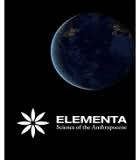
Elementa-Science of the Anthropocene
Scope & Guideline
Empowering researchers to shape sustainable solutions.
Introduction
Aims and Scopes
- Interdisciplinary research on human-environment interactions:
The journal publishes studies that explore the intricate relationships between human beings and their environment, emphasizing the socio-ecological dynamics that characterize the Anthropocene. - Sustainability and climate change mitigation:
Research focused on sustainable practices, climate change adaptation, and mitigation strategies is a core area, with an emphasis on actionable insights that can contribute to global sustainability goals. - Agroecology and food sovereignty:
The journal highlights research on agroecological practices, food systems, and the rights of marginalized communities, particularly in the context of land sovereignty and food security. - Marine and coastal ecosystem studies:
A significant focus is placed on marine and coastal ecosystems, including biogeochemical processes, impacts of climate change, and strategies for marine conservation and restoration. - Environmental justice and policy analysis:
The journal addresses issues of environmental justice, analyzing how policies can be designed to promote equity and sustainability, particularly in vulnerable communities.
Trending and Emerging
- Climate intervention technologies:
Research on genetic engineering, carbon dioxide removal, and other climate intervention technologies is gaining traction, highlighting the urgency of finding viable solutions to climate change. - Community-based and participatory research:
There is a growing emphasis on community engagement and participatory methodologies, particularly in studies related to land sovereignty and food systems, which empower local voices in environmental decision-making. - Technological innovations for environmental monitoring:
The journal increasingly features studies that leverage advanced technologies, such as remote sensing and machine learning, to monitor environmental changes and enhance data collection methodologies. - Interdisciplinary approaches to resilience and adaptation:
A notable trend is the integration of resilience thinking across various disciplines, focusing on adaptive strategies for communities facing environmental challenges, particularly in the context of climate variability. - Socio-environmental justice frameworks:
Research that frames environmental issues through the lens of social justice, equity, and human rights is emerging as a critical area of focus, reflecting broader societal movements towards inclusivity and justice.
Declining or Waning
- Traditional agricultural practices:
Research focusing solely on conventional agricultural practices has seen a decline, as the journal increasingly prioritizes studies that advocate for agroecological approaches and sustainable land management. - Single-discipline studies:
There is a noticeable decrease in publications that approach environmental issues from a purely disciplinary perspective, as the journal trends towards more interdisciplinary and holistic frameworks. - Fossil fuel dependency:
While still relevant, studies specifically addressing fossil fuel dependency without linking to broader socio-environmental contexts are becoming less frequent, reflecting a shift towards renewable energy and sustainable alternatives.
Similar Journals

GULF AND CARIBBEAN RESEARCH
Bridging Science and Conservation in Coastal WatersGulf and Caribbean Research is an esteemed academic journal published by the University of Southern Mississippi, dedicated to advancing the understanding of aquatic ecosystems in the Gulf of Mexico and the Caribbean region. With an ISSN of 1528-0470 and an E-ISSN of 2572-1410, the journal serves as an essential platform for researchers and professionals in the fields of Aquatic Science, Oceanography, and Water Science and Technology, recognized in the 2023 Q3 Quartile rankings across these disciplines. The journal welcomes diverse contributions including original research, reviews, and technical notes, encouraging interdisciplinary approaches to address ecological and environmental challenges within its scope. Despite the absence of an open access option, it provides invaluable insights, evidenced by its Scopus rankings, which position it within the 31st to 33rd percentile across various related categories. The engaging research articulated in Gulf and Caribbean Research fosters dialogue and collaboration, making it a vital resource for those committed to scientific discovery and conservation efforts in these critical aquatic environments.

JOURNAL OF COASTAL CONSERVATION
Exploring sustainable strategies for oceanic health and biodiversity.JOURNAL OF COASTAL CONSERVATION, published by SPRINGER, is a premier academic journal dedicated to the study and promotion of coastal ecosystem management and conservation strategies. With a rich publication history beginning in 1995 and spanning over multiple converged years, this journal serves as a vital platform for researchers and professionals in the fields of Ecology, Nature and Landscape Conservation, and Oceanography. Recognized for its impactful contributions, it holds a Q2 ranking in multiple categories for 2023, including Ecology and Oceanography, underscoring its significance in advancing knowledge and practice in coastal conservation. With a commitment to delivering high-quality, peer-reviewed articles, the journal facilitates discourse on critical issues affecting coastal environments, making it an essential resource for scholars and practitioners looking to enhance the sustainability and resilience of coastal habitats. The journal provides broad access to vital research findings, ensuring that both the academic community and policy-makers have the information necessary to address the pressing challenges facing coastal regions worldwide.

Research in Marine Sciences
Exploring the depths of marine science for global impact.Research in Marine Sciences, ISSN 2538-5542, is a leading journal published by ARMAN DARYA INC, specializing in the dynamic and interdisciplinary field of marine science. With a commitment to advancing knowledge in areas such as marine ecology, oceanography, and marine conservation, this journal provides a collaborative platform for researchers, professionals, and students to disseminate their findings. Although it operates under a traditional subscription model, the journal ensures that the latest research is accessible to a wide audience, promoting the understanding of marine environments crucial for biodiversity and sustainability. The journal aims to bridge the gap between theoretical research and practical applications, emphasizing the need for rigorous studies that address pressing marine issues in a rapidly changing world. By contributing to the body of literature in marine sciences, Research in Marine Sciences plays a vital role in shaping the future of marine research and policy-making.

Anthropocene Coasts
Innovating Practices for Coastal Conservation and ManagementAnthropocene Coasts is a pivotal peer-reviewed journal published by SpringerNature, dedicated to advancing the interdisciplinary understanding of coastal systems in the context of the Anthropocene epoch. Since its inception in 2018, the journal has focused on critical issues at the intersection of Nature and Landscape Conservation, Ocean Engineering, Oceanography, and Waste Management and Disposal, achieving an impressive Q2 ranking in all these categories as of 2023. With a country of origin in Canada, this journal not only addresses significant environmental challenges, but also promotes innovative solutions and sustainable practices that resonate globally. Researchers, professionals, and students engaged in marine science, environmental studies, and engineering will find valuable insights and cutting-edge research disseminated through this open-access platform. By fostering collaboration and knowledge-sharing, Anthropocene Coasts empowers its audience to contribute to the sustainable management of coastal environments in an era of rapid change.
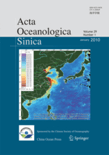
ACTA OCEANOLOGICA SINICA
Exploring the Depths of Aquatic ScienceACTA OCEANOLOGICA SINICA, published by SPRINGER, stands as a significant voice in the fields of Aquatic Science and Oceanography, contributing vital research and insights since its inception in 1985. With an ISSN of 0253-505X and an E-ISSN of 1869-1099, this journal maintains a strong international focus, delivering high-quality peer-reviewed articles that address pressing marine and freshwater environmental issues. Although it operates under a subscription model, its Q3 ranking in both Aquatic Science and Oceanography demonstrates its solid standing within Scopus, placing it in the 48th and 44th percentiles respectively. The journal aims to foster knowledge exchange and collaboration among researchers, professionals, and students by providing a platform for innovative studies and comprehensive reviews. With a dedicated editorial board and a commitment to advancing scientific understanding, ACTA OCEANOLOGICA SINICA serves as an essential resource for anyone engaged in the study of oceanographic phenomena and aquatic ecosystems.
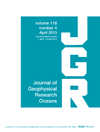
JOURNAL OF GEOPHYSICAL RESEARCH-OCEANS
Connecting Ocean Science with Global ImpactJournal of Geophysical Research-Oceans is a premier interdisciplinary journal published by the American Geophysical Union, focused on the dynamic field of ocean sciences. With a rich history dating back to 1986, this journal has become a pivotal platform for researchers, providing a wealth of data and innovative insights into oceanographic processes and their essential role within the Earth's system. The journal enjoys an impressive impact factor and consistently ranks in the Q1 quartile across numerous categories, including Earth and Planetary Sciences and Oceanography, making it a respected source for cutting-edge research and reviews. Notably, it holds significant positions within Scopus rankings, further emphasizing its importance in shaping the scientific discourse surrounding oceanic phenomena. While available through subscription, the Journal of Geophysical Research-Oceans remains an invaluable resource for academics, industry professionals, and students eager to deepen their understanding of ocean dynamics and geophysical interactions.
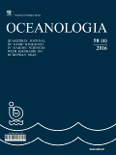
OCEANOLOGIA
Unveiling the Mysteries of the Deep BlueOCEANOLOGIA, a distinguished academic journal published by the Polish Academy of Sciences, Institute of Oceanology, serves as a pivotal platform for researchers and professionals in the fields of Aquatic Science, Oceanography, and Ocean Engineering. Established in 1973 and transitioning to Open Access in 2011, this peer-reviewed journal promotes the dissemination of high-quality research across its diverse scope of ocean-related topics, aligning with its commitment to advancing marine science. With a notable impact factor underscored by its positioning in the Q1 and Q2 quartiles of recognized categories, OCEANOLOGIA stands out with impressive Scopus Rankings, including 49/247 in Aquatic Science and 24/105 in Ocean Engineering, reflecting its significance in the global research landscape. The journal's dedication to publishing cutting-edge studies ensures that it continues to influence both academic discourse and practical applications in ocean-related fields, making it an essential resource for students, researchers, and professionals aiming to contribute to the advancement of oceanic studies.

Ocean and Coastal Research
Bridging science and sustainability in oceanography.Ocean and Coastal Research, published by the Institute Oceanográfico of the University of São Paulo, is an essential academic journal dedicated to advancing the fields of Aquatic Science, Oceanography, and Water Science and Technology. Established in 2020, the journal has quickly become a noteworthy platform contributing to the understanding and sustainable management of marine and coastal ecosystems, with an open access model that promotes the dissemination of critical research findings. Although currently categorized in the fourth quartile across its respective fields in 2023, the journal serves as an emerging repository of valuable insights for researchers, professionals, and students alike, aiming to make impactful discoveries that address contemporary challenges in ocean conservation and resource management. The journal's editorial team is committed to fostering interdisciplinary collaboration and upholding rigorous peer-review standards, thereby ensuring high-quality contributions that reflect the dynamic nature of marine science. With an E-ISSN of 2675-2824, all access to published articles is freely available, supporting global research efforts addressing crucial environmental issues.
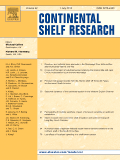
CONTINENTAL SHELF RESEARCH
Innovating Understanding of Marine Resources and ProcessesCONTINENTAL SHELF RESEARCH, published by PERGAMON-ELSEVIER SCIENCE LTD, is an esteemed journal within the fields of Aquatic Science, Geology, and Oceanography, reflecting a compelling intersection of these disciplines. Since its inception in 1982, this journal has served as a premier platform for disseminating cutting-edge research relevant to the continental shelf ecosystem, including its geological features, biological resources, and physical processes. With a Category Quartile ranking of Q1 in Aquatic Science and prominent Q2 standings in Geology and Oceanography, it is recognized for its rigorous peer-review standards and impactful contributions, evidenced by its respective rankings in Scopus. Researchers and professionals are encouraged to engage with the journal's array of high-quality articles that not only enhance scientific understanding but also inform policy and conservation efforts. This dedication to advancing knowledge makes CONTINENTAL SHELF RESEARCH an essential resource for those passionate about marine and coastal studies in the United Kingdom and globally.

GEO-MARINE LETTERS
Navigating the Frontiers of Environmental ScienceGEO-MARINE LETTERS, published by Springer, is a prestigious academic journal that has been a pivotal platform for the dissemination of innovative research in the fields of Earth and Planetary Sciences, Oceanography, Environmental Science, and Geotechnical Engineering since its inception in 1981. With an E-ISSN of 1432-1157, this journal has established itself in the Q2 quartile across multiple categories in 2023, indicating its influential position within the scientific community, as reflected by its Scopus rankings. While it currently does not offer an open access option, its rigorous peer-review process ensures the publication of high-quality research that contributes significantly to advancing our understanding of marine and geological sciences. Researchers, professionals, and students alike will benefit from the diverse scope of studies featured in GEO-MARINE LETTERS, making it an essential resource for those engaged in environmental and marine research. Situated in Germany, the journal's commitment to excellence continues to shape critical discussions and innovations in the field.